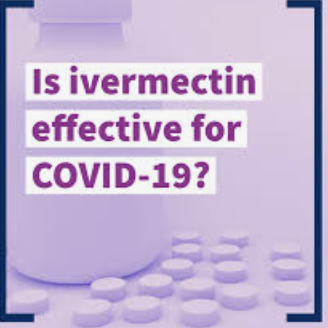Ivermectin is a great drug – just not for treating COVID-19.
While a handful of studies early in the pandemic suggested that ivermectin might be helpful for the treatment of COVID, multiple large and well-executed randomized, placebo-controlled clinical trials subsequently have provided overwhelming evidence that ivermectin provides no benefit in the treatment of COVID in developed countries. I do wonder whether a high rate of co-infection with helminths (worms) in some developing countries may have contributed to the benefit in some of the early studies, because we know that COVID often results in suppression of the immune system and susceptibility to new or recurrent opportunistic infections, such as strongyloidiasis. If I were treating a COVID patient in a developing world country with a high rate of strongyloides infection, I would consider giving ivermectin concurrently with anti-viral for SARS-CoV-2 like Paxlovid or remdesivir. But the ivermectin would be treating the worms, not the COVID. For treating COVID in places where we have incredibly low rates of helminth infections, studies make it clear that ivermectin provides absolutely no benefit. If you pull all placebo-controlled RCT’s from the National Library of Medicine database (PubMed), you get a good picture of the evidence. Here is a list of all these placebo-controlled, randomized controlled trials categorized by result – most of them have open access, so you can read them:
No Evidence of Clinical Benefit
- Naggie et al – pubmed.ncbi.nlm.nih.gov/36269852/
- Bramante et al – https://pubmed.ncbi.nlm.nih.gov/36070710/
- Reis et al – https://pubmed.ncbi.nlm.nih.gov/35353979/
- Lopez-Medina et al – https://pubmed.ncbi.nlm.nih.gov/33662102/
- Lim et al – https://pubmed.ncbi.nlm.nih.gov/35179551/
- Vallejos et al – https://pubmed.ncbi.nlm.nih.gov/34215210/
- El Shafie et al – https://pubmed.ncbi.nlm.nih.gov/35788169/
- De la Rocha et al – https://pubmed.ncbi.nlm.nih.gov/36482326/
- Mirahmadizedah et al – https://pubmed.ncbi.nlm.nih.gov/35738778/
- Manomaipiboon et al – https://pubmed.ncbi.nlm.nih.gov/36028897/
- Buonfrate et al – https://pubmed.ncbi.nlm.nih.gov/34999239/
- Evidence of Virological benefit; No Clinical Benefit
- Biber et al – https://pubmed.ncbi.nlm.nih.gov/35811080/
- Ahmed et al – https://pubmed.ncbi.nlm.nih.gov/33278625/
Evidence of Clinical Benefit
- Shahbaznejad et al – https://pubmed.ncbi.nlm.nih.gov/34052007/
As you can see, the only RCT that appeared to show clinical benefit of ivermectin was a small study from Iran, that analyzed 35 patients in the treatment (ivermectin) group. Two studies (from Bangladesh and Israel) that analyzed fewer than 70 ivermectin-treated patients showed some evidence that viral clearance was faster, but there was no clinical (symptoms or outcome) benefit. The rest of the studies, enrolling far more patients, showed no clinical benefit from ivermectin. The first two studies are quite strong, led by Duke University and University of Minnesota respectively, enrolling almost 3,000 patients between them. These studies also looked specifically at severe COVID, hospitalization, and death, which the Biber, Ahmed, and Shahbasnejad studies were not able to do. Reis et al, a 3,500 participant RCT in Brazil, also looked at hospitalization and severe COVID, again finding no benefit.
As you can see, the clinical evidence showing no benefit from ivermectin treatment is exceptionally strong.
Nevertheless, I have often seen the statement, “Well, you don’t know for sure that it doesn’t work, and since the drug is safe, what’s the harm?” I would argue that the trials actually have proven definitively that ivermectin is not an effective treatment for COVID. However, let’s say you reserve an outside chance that the drug could be helpful in some cases – why not give it? I would argue that there are three rational arguments why we should not give ivermectin.
First, although ivermectin has a very good safety profile, that doesn’t mean it never causes harm. We have extensive experience giving the drug to mostly younger and healthier patients to treat helminth infections, and it has low rates of adverse events in that population. However, many COVID patients we treat are older and higher risk, having multiple co-morbidities and long lists of outpatient medicines. We have less experience with ivermectin in this group. Even assuming we maintain a very low rate of adverse events, if we are treating millions and millions of persons, we are still going to get many (likely dozens or hundreds) rare but significant adverse events that will harm people without offering any benefit.
Second, people who hear about the benefit and use of ivermectin will inevitably attempt to self-treat, often with formulations made for animals and not humans. These formulations may have dramatically different concentrations/dosing and other ingredients that may be harmful. In fact, we know this has happened based upon multiple reports of ivermectin toxicity incidents from people self-treating.
Third, and likely most importantly, seeking and receiving treatment with ivermectin probably delays or altogether eliminates therapy with drugs that we know have very good efficacy in reducing severe disease from COVID. If you get treatment with ivermectin, you are not going to get immediate treatment with Paxlovid or remdesivir. We already know that Paxlovid reduces progression to severe COVID by 90% in those who receive early treatment. Remdesivir has similar efficacy for outpatient treatment. Anything that delays or prevents this effective treatment is doing harm.
So, the logic is pretty clear. If you have COVID, you should seek treatment, particularly if you are higher risk for severe outcome. That treatment should be Paxlovid if possible. If not, remdesivir is a good second option, and molnupiravir is probably your third choice. There might be some other adjunctive options – data on metformin is interesting. But these first three clearly have the best evidence for efficacy.
James Lawler, MD, MPH, FIDSA
Global Center for Health Security
University of Nebraska Medical Center
